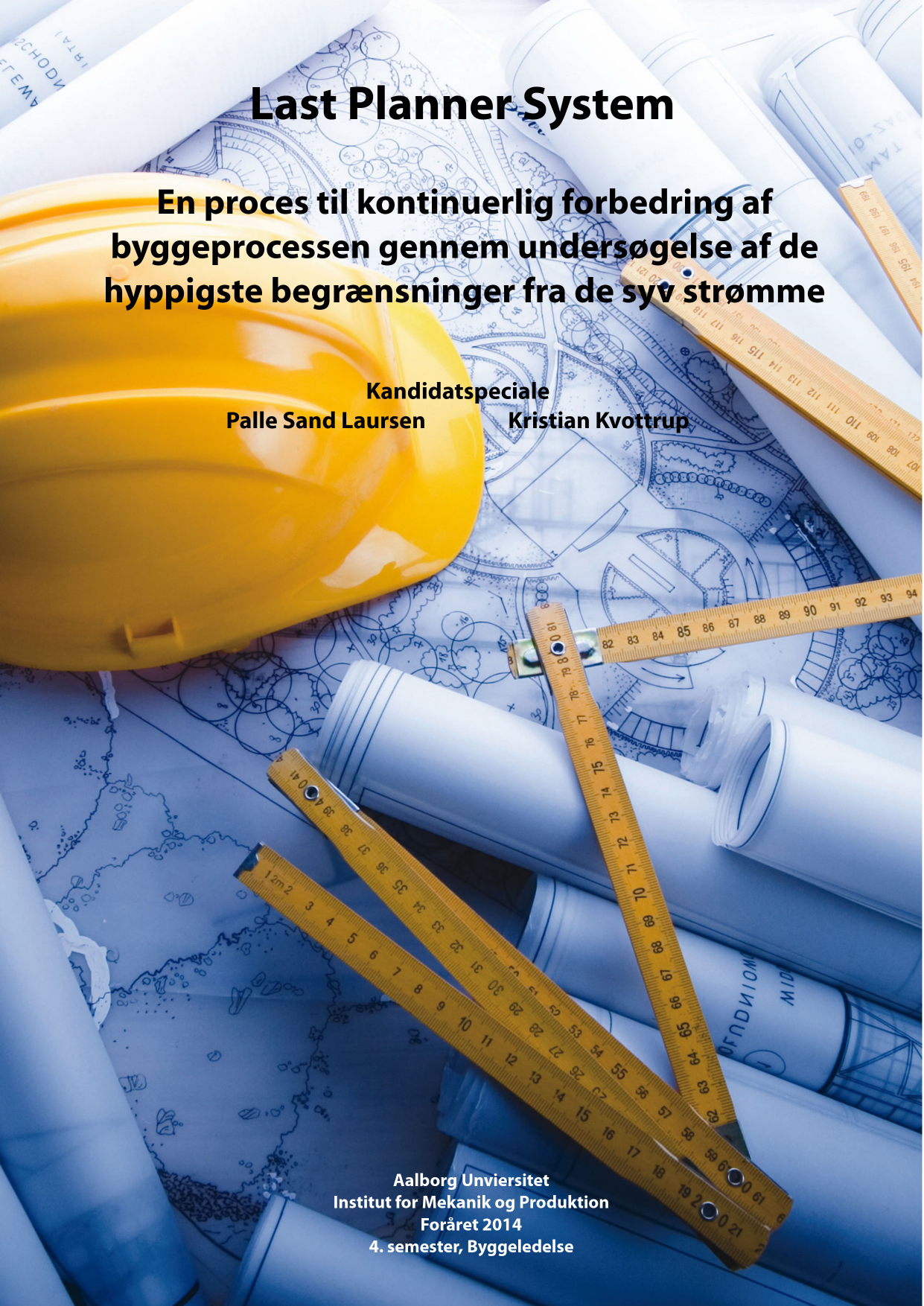
Last Planner System - En proces til kontinuerlig forbedring af byggeprocessen gennem undersøgelse af de hyppigste begrænsninger fra de syv strømme
Oversat titel
Last Planner System - A proces for continuous improvement of the building process through study of the most frequent limitations of the seven preconditions
Forfattere
Semester
4. semester
Uddannelse
Udgivelsesår
2014
Afleveret
2014-06-02
Antal sider
104
Abstract
Dette specialeprojekt omhandler produktionsstyringssystemet 'Last Planner System' og hvordan dette kan være medvirkende til at øge produktiviteten i en byggeproces. Projektet fokuserer på teorien omkring Last Planner System, og hvordan teorien i praksis kan bruges til at fremme byggeprocessen igennem en forbedring af antallet af færdiggjorte opgaver ift. antallet af planlagte opgaver (PPU). Det er undersøgt gennem to casestudier, hvilke af de 7 strømme der typisk begrænser arbejdsopgaverne i at blive udført som planlagt. Ydermere er der fundet grundårsager til hvorfor arbejdsopgaverne ikke blev udført som planlagt og konsekvenserne af dette. Med udgangspunkt i de fundne resultater er der givet en række forbedringsforslag som kan være medvirkende til at forbedre byggeprocessen fremadrettet.
Unlike other industries, the building industry has now for some time experienced a stagnation in the labour productivity. The reasons for this are found in the building process which, unlike many other industries, is subject to an unpredictable and chaotic process, thus making it difficult to implement already known production philosophies such as lean production. This report deals with the production planning system \textit{Last Planner System} (LPS) which is a theory that seeks to optimize the building process by reducing the unpredictability and seeking continuous improvements. The reduction of the unpredictability is done by ensuring that the planned work tasks that 'should' be done also 'can' be done and thus 'will' be done. Unlike traditional planning where the planned work tasks prior to the project are planned in a master schedule and afterwards followed, the work tasks in LPS are only included in the weekly work plans if the activities are sound. This is done by having focus on the coming work tasks in the look-ahead schedule and removing any constraints that might hinder the activity in being done, before including these work-task in the work plan. By doing this it is possible to make the work tasks sound before including them in the weekly work plans and thus making sure that any planned work tasks in fact can be finished on time. Another important aspect of the LPS is the seeking of continuous improvements. By measuring the percent of completed planned work tasks (Percent Planned Completed, PPC) it is possible to measure the quality of the planning. By then identifying the reasons for non-completion it is found which root causes have the greatest impact on the planning. These root causes are dividing into the seven preconditions, which include: Information, material, crew, materiel, space, previous activities and external conditions (which can be further divided into weather, safety and surroundings). By identifying the root causes and either minimizing or eliminating these in the future it is possible to avoid similar errors. This report includes two case studies, where the project team has observed the planning of two companies and measured the PPC and identifying the root causes for non-completed work tasks. The purpose of this was to determine whether any patterns in the reasons for non-completion could be found. These reasons were identified relative to the seven preconditions. The effects were found for each of the seven preconditions in terms of both frequency and consequence. By measuring both frequency and consequence it was possible to identify which preconditions had the hugest impact on the project and thus which precondition would be most profitable to look into and prevent in the future. It was found that the precondition 'information' to a greater extent was the reason why planned work tasks were not completed on time and that this same precondition had the overall biggest effect on the two cases. This was backed up by similar result from different studies and by accounts from the anticipating constructions managers on the two cases. Bases on these results there are given several suggestion for improvement for the two cases. These suggestions primarily deals with an deeper implementation of the LPS in practise.
Emneord
